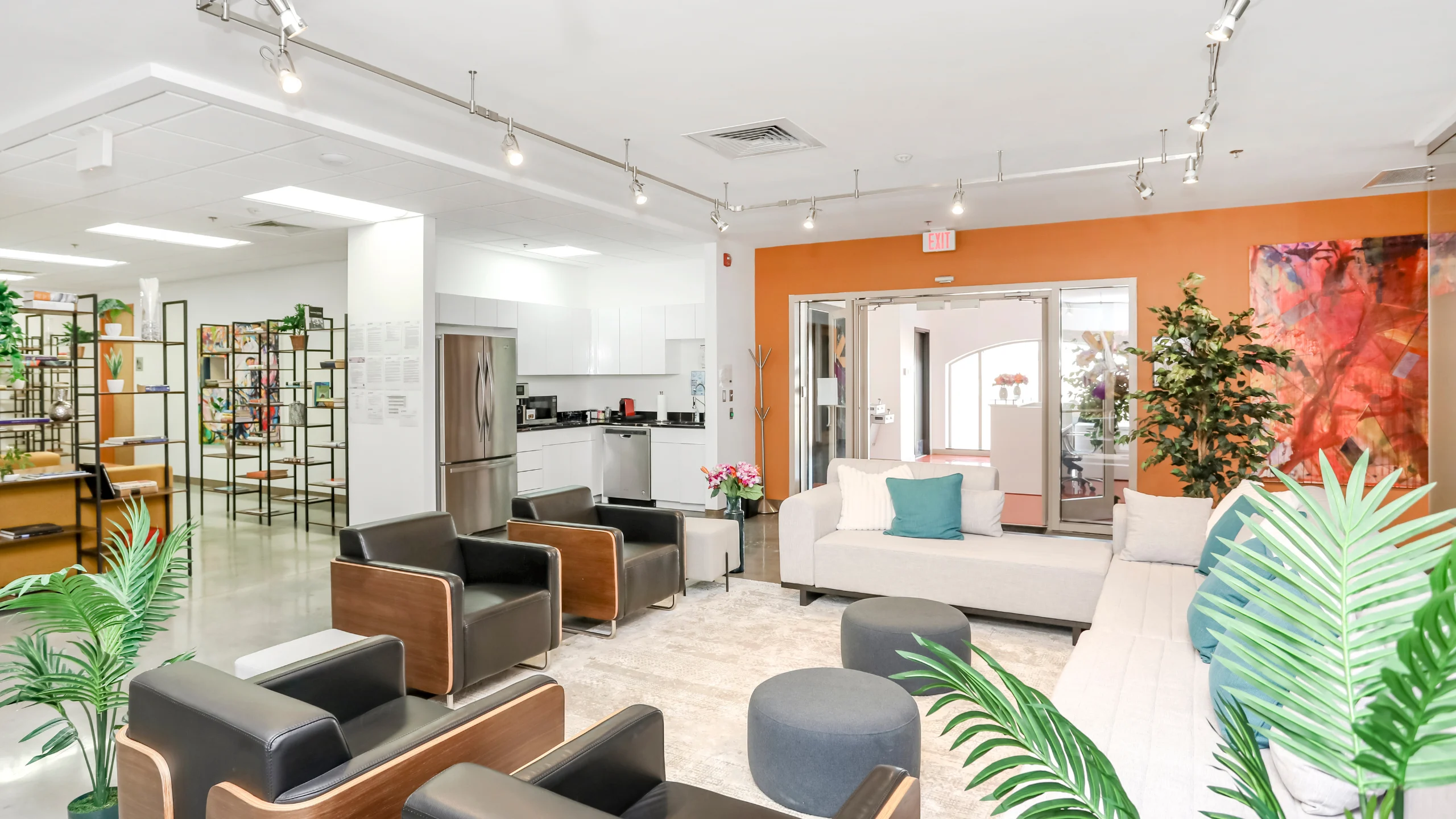Depression and substance abuse often affect each other. This creates a cycle where self-medication gives temporary relief. However, it only makes the emotional pain worse.
If you are dealing with depression, it is easy to think that alcohol or drugs can help. But what often happens is that these substances only make things worse.
Over time, they can make the emotions you want to escape even stronger. This can trap you in a painful cycle that is hard to break.
Depression is a mental health condition. It causes ongoing feelings of sadness and hopelessness.
People with depression often lose interest in daily activities. They may also experience changes in sleep, appetite, and energy levels. These changes can affect how well a person functions in daily life.
With depression, the things you once enjoyed, things that used to light you up, might not bring you any joy anymore. Your thoughts can get cloudy, and your memory may feel foggy. Even simple tasks like eating or sleeping can become harder.
It’s normal to feel sad after something tough, like a breakup or losing a job. However, depression does not go away after a few days. It can last for weeks or even longer.
This sadness is not ordinary. It impacts every part of you: socially, emotionally, mentally, and physically.
If you find yourself in this state, day after day, it’s more than just a passing mood. It’s something that deserves your attention.
The types you’ll come across most often include:
Major Depressive Disorder (MDD)
Major Depressive Disorder (MDD) is what most people picture when they think of depression. When someone has MDD, they feel deep sadness. This sadness can make it hard to enjoy anything, even things they used to like. Common symptoms include:
Most of the time, treatment includes a blend of psychotherapy and medication. For serious cases, you might consider electroconvulsive therapy (ECT) if antidepressants or therapy do not work.
Chronic Depression (Dysthymia)
Chronic depression might not strike you with the intense impact of major depression, but don’t be fooled—it’s just as serious. It tends to last longer, subtly impacting your daily life. If you’ve been grappling with it for at least two years, you might notice at least three of these symptoms:
Chronic depression can have times when it gets better. However, it usually does not go away completely without help. It often lasts longer than many other types of depression. Even if it doesn’t show the severe symptoms of major depression, it can still impact daily life a lot.
Bipolar Disorder
Bipolar disorder, once called manic-depressive illness, is a mental health condition. It involves episodes of depression and times of high energy or activity. During these “high” periods, called mania or hypomania, the symptoms are almost the opposite of depression. During a manic episode, you might experience:
When in a depressive episode, symptoms are more typical of major depression:
When depressive episodes happen along with a history of mania or hypomania, the diagnosis is bipolar disorder. But if a person has no history of those manic episodes, doctors usually consider it major depressive disorder (MDD).
Seasonal Affective Disorder (SAD)
SAD is tied to changes in the seasons, particularly during the colder months when there’s less sunlight. Symptoms include:
For many people, symptoms typically start in the fall or winter and clear up in the spring. Light therapy, along with other treatments, can help manage SAD.
Psychotic Depression
PD is a severe form of depression that involves more than just intense sadness. When you struggle with psychotic depression, you experience sadness along with psychosis (a disconnect from reality). This can show up in different ways, like:
Clinical research has shown that this condition affects about one in four people hospitalized for severe depression.
Atypical Depression
Atypical depression is a type of depression. It has symptoms that are different from major depressive disorder. Some of the main characteristics of atypical depression include:
Women are more likely to feel depressed than men. They are also more prone to specific types of depression. These types are often connected to hormonal changes.
Perinatal Depression
This includes depression that occurs during pregnancy or in the year after childbirth (known as postpartum depression). Around 1 in 7 women who give birth will experience perinatal depression. It can be incredibly challenging, affecting not just the mother but her relationship with her child and family.
Premenstrual Dysphoric Disorder (PMDD)
PMDD is a more extreme version of premenstrual syndrome (PMS) and can lead to much stronger symptoms. Usually, these symptoms kick in after ovulation and fade away when menstruation starts. Some of the symptoms include:
Selective Serotonin Reuptake Inhibitors, like Paroxetine (Paxil), Fluvoxamine (Luvox), Prozac or Zoloft, can help alleviate these symptoms.


Substance abuse happens when a person often uses alcohol, prescription drugs, or illegal drugs. This use can harm their health or well-being. Over time, this kind of behavior can lead to addiction, physical health problems, strained relationships, and legal issues.
For some people, using substances may begin as a way to deal with feelings like anxiety, stress, or depression. However, it often makes things worse instead of better.
It’s hard to know exactly how much drug use there is, but it’s clear that drugs are everywhere in our society. They come in many forms, both legal and illegal, and are part of daily life for many people.
Alcohol and drugs are now a big part of our culture. They can be found in bathrooms, fridges, cars, and on the streets. Here’s a closer look at some of the most commonly abused substances and how they affect those who use them.
Alcohol
Alcohol ranks as one of the most widely misused substances, not just in America but across the globe. Since it’s legal for adults to purchase and consume, it’s often seen as a normal part of social life.
Unfortunately, that makes it easy to overlook the signs of alcohol dependency. Frequent alcohol abuse can cause serious liver issues, impact brain health, and increase aggressive or violent tendencies. Moreover, it raises the likelihood of accidents, both while driving and in everyday life.
Marijuana
Marijuana, also known as cannabis, is the dried parts of the cannabis plant. This includes its leaves, flowers, stems, and seeds. It’s one of the most widely used substances in the country, especially with many states now legalizing recreational use. This plant is packed with a variety of chemicals, with THC being the most famous one, known for its ability to alter the mind.
Using cannabis products that contain THC can lead to changes in your mood, thoughts, and even how you perceive reality. Some people seek these effects, but it’s important to remember that THC can also harm your brain and body. In recent years, many cannabis products have become available. There has also been a rise in THC strength and ways to use it.
Stimulants
Stimulants are substances designed to increase alertness and energy by speeding up the central nervous system (CNS). While some are prescribed for conditions like ADHD or mood disorders, others are misused for their stimulating effects. Common stimulants include:
These substances can lead to dependency, heart problems, anxiety, and other health complications if used improperly or excessively.
Depressants
Depressants do the opposite of stimulants—they slow down the CNS. These are often prescribed for anxiety, pain relief, or insomnia, but misuse can be dangerous. Overuse can cause severe sedation, respiratory depression, or even coma. Common depressants include:
While they can help manage health issues when prescribed, misuse or dependence can lead to serious health risks.
Opioids
Opioids are substances derived from opium that interact with specific brain receptors to relieve pain. They are important in hospitals for anesthesia and pain relief.
However, they can be very addictive. Many people often abuse them. Frequent use can lead to tolerance, addiction, and painful withdrawal symptoms. Common opioids that are often abused include:
If you or someone you care about is having trouble with these substances, it is important to reach out. Contact a healthcare provider or a local rehab center for the right help. Taking that first step could lead to life-changing recovery and healing.
Depression and addiction often happen together, creating a tough cycle that’s hard to escape. If you have depression, you may start using alcohol, drugs, or gambling to deal with the emotional pain.
It might seem like an easy way to dull the sadness, hopelessness, or anxiety. Over time, this can lead to addiction. Your brain changes and makes it harder to manage emotions without those substances.
On the other side, addiction can make depression feel like a never-ending nightmare. It piles on new problems like health issues, rocky relationships, and money troubles, making you feel even more weighed down.
It’s more common than you might think for mental health struggles and substance abuse to go hand in hand. Some statistics from the Journal of the American Medical Association show how common this issue is.
These numbers highlight how deeply connected depression and addiction can be, showing that help for both is essential.
When it comes to the connection between depression and addiction, several factors could be at play. You might find that these issues are intertwined in your life or the life of someone you care about. Here’s a closer look at what might be contributing:
Our caring professionals are standing by around the clock, ready to address all your questions.
When depression and substance misuse happen together, their signs can mix. This makes it harder to understand what is happening. You might notice a range of symptoms that affect both your mental health and your ability to function normally in daily life.
In addition to these, you could experience other mental health symptoms like:
As for the substance use signs, here are a few things to consider:
If you’re seeing more than one sign from each group, it’s time to get evaluated. The sooner you handle these issues, the easier it will be to get the right support and treatment.
When you have depression, it can feel very heavy. You might want to use alcohol or drugs to escape those feelings.
The emotional pain, low self-esteem, and hopelessness may lead you to seek temporary relief through drugs or alcohol. Sadly, what begins as a way to ease the pain can quickly turn into dependence or addiction. This makes it even harder to cope over time.
Substance abuse can worsen depression by disrupting brain chemistry, which may reduce the effectiveness of antidepressants. Additionally, withdrawal symptoms often mimic the feelings of depression, trapping individuals in a harmful cycle.
Substance abuse can lead to serious problems. These include legal issues, money troubles, and strained relationships. These problems can make feelings of hopelessness even worse.
This mix makes it harder to escape from both depression and addiction. It creates a much heavier emotional burden.

We know that cost is a major factor for most people when seeking treatment for drug & alcohol abuse in Virginia. Novara Recovery Center works with most major insurance plans to help cover up to 100% of the costs associated with treatment at our program. To find out your personal options for treatment, get a free verification of insurance benefits right now by clicking the button below.









The mix of depression and substance use disorder poses many risks to a person’s health and well-being.
One of the most significant dangers of dual-diagnosis depression and substance use is an increased risk of suicide. Both conditions can make people feel trapped in their pain. The impulsive behavior linked to substance abuse can make these feelings worse.
Substance abuse can significantly worsen depression by altering brain chemistry and making it harder to manage mood and emotions. Long-term use of drugs or alcohol can lead to serious health problems. These include liver disease, chronic pain, muscle aches, joint pain, fibromyalgia, a weak immune system, and heart issues.
The combination of depression and substance abuse can hurt relationships. This can lead to social isolation and more feelings of loneliness. Family and friends might find it hard to understand the person’s behavior. The individual may turn to substance use to cope with the problems in their relationships.
When you’re dealing with both addiction and depression, treatment needs to be exhaustive and tailored to address both issues at the same time.
The Substance Abuse and Mental Health Services Administration believes that a combined approach improves results. It also reduces the chance of relapse compared to treating each illness separately. An integrated treatment approach combines therapy, medication, and online counseling. This method helps tackle the causes and symptoms of addiction and mental health issues.
There are many therapies that can be part of your treatment plan. This depends on what works best for your recovery.
Psychotherapy
DBT includes mindfulness and helps with managing emotions, especially for those with strong feelings. These therapies help you develop skills to cope with life’s challenges and prevent relapse.
Group Therapy
Group therapy is a kind of therapy. In this setting, you join a small group with others and a therapist. Together, you work on personal, relationship, and social challenges.
It’s a great way to find support and make real changes in your life. The goals of group therapy include:
Medications
Mutual support groups and self-help programs provide a friendly, supportive environment, especially in recovery. They help you stay connected and strong, especially when you might feel most vulnerable to relapse.
It is great that they do not need funding or fees. This makes it available to anyone who needs support. They include:
These groups are a lifeline. They help you feel understood and provide coping strategies you can use when things get tough.
Aftercare programs are equally important once your initial treatment phase is over. These programs help you stay on track and prevent relapse. Some of the aftercare options include:
These treatment programs help you stay committed to living a fulfilling life, free from the weight of addiction and depression.
If you or a loved one is battling drug or alcohol addiction in Fairfax, Virginia, Novara Recovery Center is here to help. Our diverse team of experts uses a whole-person approach to care.
We offer therapies that treat depression and substance use by healing both the mind and body. These effective treatment options include medication-assisted treatment, Cognitive Behavioral Therapy (CBT), family therapy, and Dialectical Behavior Therapy (DBT). We also provide Motivational Interviewing (MI), equine therapy, music therapy, art therapy, and acupuncture.
Take the first step today. Visit us at 2815 Old Lee Hwy Floor 2, Fairfax, VA 22031, or call (703) 705-7870. You can also email us at info@novararecovery.com. We’re here to help you begin your recovery journey, and we’re with you every step of the way.
Average Cost of Drug Rehab: https://drugabusestatistics.org/cost-of-rehab/
Substance Abuse and the Affordable Care Act: https://obamawhitehouse.archives.gov/ondcp/healthcare
401(k) Plan: https://www.investor.gov/introduction-investing/investing-basics/glossary/401k-plan
Depression: https://medlineplus.gov/ency/article/003213.htm
Psychotic Major Depression (PMD): https://pmc.ncbi.nlm.nih.gov/articles/PMC3111977/
Depression Medicines: https://www.fda.gov/consumers/womens-health-topics/depression-medicines
Written By:

Mental Health Writer
Geoffrey Andaria is a seasoned writer and editor specializing in mental health content. With a B.A. in English and Journalism, he possesses a solid foundation in crafting freelance articles and conducting research. Geoffrey has also completed courses in social work. He dedicates himself to providing valuable and informative content for individuals impacted by mental health challenges and addiction.
Medically Reviewed By:

Expert Contributor
Dr. Williams is currently a board member for two non-profit service organizations. He holds a Master’s degree in Human Services from Lincoln University, located in Philadelphia, Pennsylvania.
He possesses a Ph.D. in Clinical Psychology from Union Institute and University, located in Cincinnati, Ohio. He holds a license to offer addiction counseling in both New Jersey and Connecticut. Additionally, he has submitted an application to become a licensed psychologist in New Jersey.






2815 Old Lee Hwy Floor 2, Fairfax, VA 22031